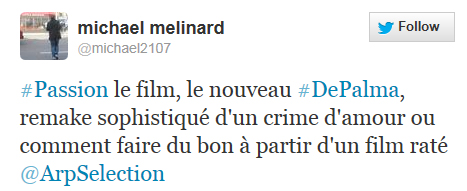
In English:
"# Passion film, new # DePalma, sophisticated remake of Love Crime or how to make a good movie from a bad one"
Updated: Friday, January 18, 2013 6:26 PM CST
Post Comment | Permalink | Share This Post
 Hello and welcome to the unofficial Brian De Palma website. Here is the latest news: |
|---|
E-mail
Geoffsongs@aol.com
-------------
Recent Headlines
a la Mod:
Listen to
Donaggio's full score
for Domino online
De Palma/Lehman
rapport at work
in Snakes
De Palma/Lehman
next novel is Terry
De Palma developing
Catch And Kill,
"a horror movie
based on real things
that have happened
in the news"
Supercut video
of De Palma's films
edited by Carl Rodrigue
Washington Post
review of Keesey book
-------------
Exclusive Passion
Interviews:
Brian De Palma
Karoline Herfurth
Leila Rozario
------------
------------
| « | January 2013 | » | ||||
| S | M | T | W | T | F | S |
| 1 | 2 | 3 | 4 | 5 | ||
| 6 | 7 | 8 | 9 | 10 | 11 | 12 |
| 13 | 14 | 15 | 16 | 17 | 18 | 19 |
| 20 | 21 | 22 | 23 | 24 | 25 | 26 |
| 27 | 28 | 29 | 30 | 31 | ||
De Palma interviewed
in Paris 2002
De Palma discusses
The Black Dahlia 2006

Enthusiasms...
Alfred Hitchcock
The Master Of Suspense
Sergio Leone
and the Infield
Fly Rule
The Filmmaker Who
Came In From The Cold
Jim Emerson on
Greetings & Hi, Mom!
Scarface: Make Way
For The Bad Guy
Deborah Shelton
Official Web Site
Welcome to the
Offices of Death Records

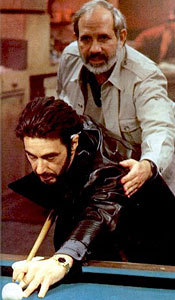 Thanks to Greg Srisavasdi at Hollywood Outbreak for reminding us that, back in 1997, Al Pacino had been in talks for the part of Kevin Dunn in Brian De Palma's Snake Eyes. Pacino eventually turned it down, and Gary Sinise ended up taking on the role opposite Nicolas Cage (Will Smith had also flirted with that project). But there is another little-known project that De Palma and Pacino had tried to put together way before Scarface.
Thanks to Greg Srisavasdi at Hollywood Outbreak for reminding us that, back in 1997, Al Pacino had been in talks for the part of Kevin Dunn in Brian De Palma's Snake Eyes. Pacino eventually turned it down, and Gary Sinise ended up taking on the role opposite Nicolas Cage (Will Smith had also flirted with that project). But there is another little-known project that De Palma and Pacino had tried to put together way before Scarface.Guare's Cop-Out is a surreal play in which two policemen, one in uniform and one in plainclothes, are played by the same actor, who interchanges (amidst stage blackouts and musical cues) between the two counterpoints of straight-laced police work (the stuttering uniformed one) and noirish absurd fantasies (the smooth and cocky plainclothes one). Each man interacts with a woman, the only other performer in the piece, and she alternates along with him. At one point, the plainclothes cop is drawn into an avant-garde play (a play-within-the play) which finds him under the covers, servicing Marilyn Monroe under the guise of several U.S. presidents, from Washington to Lincoln to Roosevelt, etc. The actor pops up from under the covers to deliver each president's gag-line as Groucho Marx might (complete with cigar), singing crude songs, etc.
The driving "plot" of the play is a whodunnit detective story, with a marked contrast between the cops who, played by the same actor, seem like two sides of the same personality. This aspect, of course, would have fit right in with the types of films De Palma would go on to make throughout his career, and it seems likely he might have envisioned some sort of split-screen for the film version, having just finished the split-screen Dionysus In '69. It certainly would have been an interesting film.
DE PALMA AUDIO SNIPPET
While you're at the Hollywood Outbreak link, check out Srisavasdi's snippet of audio from an interview he did with De Palma for Femme Fatale a little over a decade ago, in which the director talks about leaving enough room in a screenplay to allow for visual design. Great stuff!
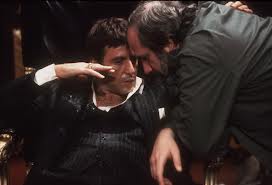 Well, I thought there was some reason Brian De Palma had suddenly dropped out of the Jason Statham Heat remake a few weeks ago. Looks like he was cooking up something big with two of his old friends. Deadline's Mike Fleming broke the news today that De Palma will reteam with Al Pacino for Happy Valley, "the working title of a film that will tell the story of Penn State head football coach Joe Paterno," according to Fleming. The focus of the film is being kept under wraps for now, but Fleming writes that "Paterno’s legend was undone by revelations he and others in the football program were aware that former defensive coordinator Jerry Sandusky was molesting children, and did little to stop it, supposedly fearing bad publicity for the powerhouse gridiron program they presided over."
Well, I thought there was some reason Brian De Palma had suddenly dropped out of the Jason Statham Heat remake a few weeks ago. Looks like he was cooking up something big with two of his old friends. Deadline's Mike Fleming broke the news today that De Palma will reteam with Al Pacino for Happy Valley, "the working title of a film that will tell the story of Penn State head football coach Joe Paterno," according to Fleming. The focus of the film is being kept under wraps for now, but Fleming writes that "Paterno’s legend was undone by revelations he and others in the football program were aware that former defensive coordinator Jerry Sandusky was molesting children, and did little to stop it, supposedly fearing bad publicity for the powerhouse gridiron program they presided over." Last September, Fleming reported that Pacino was attached to play Paterno. At that time, Nicita was named as the producer, and the project was being shopped around. In that September post, Fleming wrote, "The narrative arc of the movie that will be shopped is obvious. A man becomes the winningest coach in college football history and builds a powerhouse football program that turns him into a campus deity. When his former defensive coordinator Jerry Sandusky is revealed to be a pedophile and it comes out Paterno was told and helped hide the scandal, the coach was summarily fired. He died shortly after of cancer — and many feel of a broken heart — and the school had little choice but to raze a fabled statue of Paterno just as the NCAA dropped the hammer with sanctions against the school that included removal of Paterno’s wins going back to the cover-up. Sandusky was found guilty on 45 counts of sexual abuse against young boys and is expected to spend the rest of his life in prison."
Last September, Fleming reported that Pacino was attached to play Paterno. At that time, Nicita was named as the producer, and the project was being shopped around. In that September post, Fleming wrote, "The narrative arc of the movie that will be shopped is obvious. A man becomes the winningest coach in college football history and builds a powerhouse football program that turns him into a campus deity. When his former defensive coordinator Jerry Sandusky is revealed to be a pedophile and it comes out Paterno was told and helped hide the scandal, the coach was summarily fired. He died shortly after of cancer — and many feel of a broken heart — and the school had little choice but to raze a fabled statue of Paterno just as the NCAA dropped the hammer with sanctions against the school that included removal of Paterno’s wins going back to the cover-up. Sandusky was found guilty on 45 counts of sexual abuse against young boys and is expected to spend the rest of his life in prison."
Fleming was soon flooded with e-mails, and updated the post with this:
"The administration at Penn State chose to protect its cherished powerhouse and lucrative football program, and went against the contract that any institution of higher learning has, which is to protect the young and vulnerable. The idea that this just somehow happened, and nobody but Sandusky was to blame, is something I will never embrace. Had that been the case, I doubt the university would have fired Paterno and later torn down his statue, or that the NCAA would have leveled devastating sanctions against the football program at the expense of current players who had absolutely nothing to do with any of this and who didn’t deserve punishment that was delivered to send a clear message about prioritizing what is important. Regretfully, that is Paterno’s enduring legacy now. But keep the emails coming!"
"There are so many themes to deal with here, from Paterno’s rise and his loyalty to a football program he spent his life building, to the obvious question of how a molder of young men could possibly have stood silently by when told that one of his former coaches started a charity for underprivileged kids and used it as a way to ingratiate himself into vulnerable young fatherless boys for sexual encounters? The failure of Paterno and university officials to act allowed Sandusky to continue molesting boys for years, which was borne out in court testimony leading to his conviction and incarceration. Posnanski was working on a book about Paterno and was well into it when the scandal broke. The book is as much about what made Paterno tick as anything else, and capturing complex characters is something Pacino does well. He played a conflicted pro football coach in Any Given Sunday, and Jack Kevorkian in the HBO film You Don’t Know Jack."

At the start of his post on the film, Prime writes, "In 1987, Brian De Palma and iconic key collaborators including spitfire screenwriter David Mamet and legendary composer Ennio Morricone, set out to realize a historical crime epic like none other. De Palma is a larger than life director known to embrace bold stylistic choices, Mamet writes dialogue that comes out of some kind of curse-laden meta-reality, and Morricone’s score contains in itself a storybook quality, that every moment is deliberately crafted to dramatize history, to realize a respectful spectacle."
 Last week, Ryan Murphy answered some questions about the latest episode of American Horror Story: Asylum for Entertainment Weekly's Tim Stack. Below are the first few questions of the interview:
Last week, Ryan Murphy answered some questions about the latest episode of American Horror Story: Asylum for Entertainment Weekly's Tim Stack. Below are the first few questions of the interview:I loved that location. And that’s a real mausoleum?
Yes.
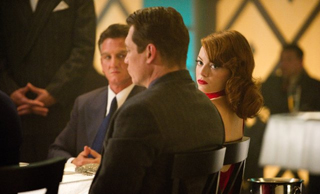 I went to see Gangster Squad today. It's a pretty good movie, and definitely pulls shot ideas from De Palma's The Untouchables, as well as other gangster movies (and the slow-motion scene in which Ryan Gosling's character turns and decides he is going to go after Mickey Cohen after all reminded me of the great Kirk Douglas slow-motion anger gun march in the big set-piece of De Palma's The Fury). In all fairness to director Ruben Fleischer, it is obvious that if he pulled from any of these shots, they are just blips in a movie he has made his own way. Gangster Squad could have been a weightier film under a different director, with this great cast and this script, but as it stands, it is a fast-paced entertainment that, while it sometimes feels a bit too slick for its own good, still manages to satisfy.
I went to see Gangster Squad today. It's a pretty good movie, and definitely pulls shot ideas from De Palma's The Untouchables, as well as other gangster movies (and the slow-motion scene in which Ryan Gosling's character turns and decides he is going to go after Mickey Cohen after all reminded me of the great Kirk Douglas slow-motion anger gun march in the big set-piece of De Palma's The Fury). In all fairness to director Ruben Fleischer, it is obvious that if he pulled from any of these shots, they are just blips in a movie he has made his own way. Gangster Squad could have been a weightier film under a different director, with this great cast and this script, but as it stands, it is a fast-paced entertainment that, while it sometimes feels a bit too slick for its own good, still manages to satisfy.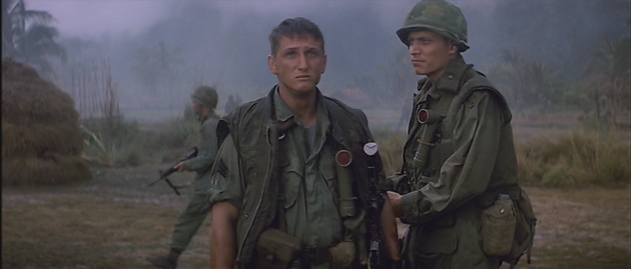
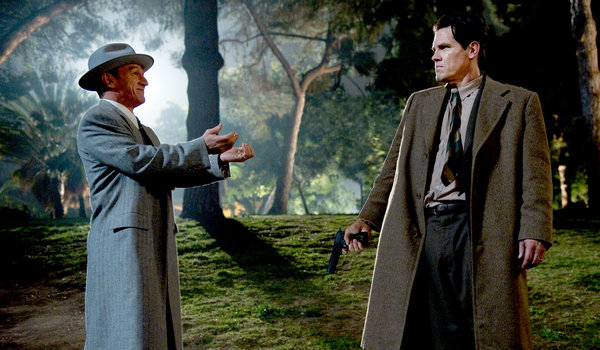
"But let’s back up for a second and talk about propaganda and how it really works. I’d like to declare a temporary truce around the issue of Zero Dark Thirty and its depiction of torture, at least long enough for us to agree that the question of whether or not the film is propagandistic is now a matter of extensive public discourse. Nearly no one will raise such questions about Gangster Squad, because it does not depict recent history and because it’s a conspicuously artificial Hollywood entertainment released in January. One could argue, however, that those things make it more effective as propaganda than an overtly disturbing film like Zero Dark Thirty could ever hope to be, since the message delivery is almost invisible...
"Many superior films about the murkier eras of L.A.’s past, most prominently Chinatown and L.A. Confidential, have been profoundly shaped by an awareness of the darkness beneath the California dream. On the surface, Gangster Squad is simply a trivial entertainment that doesn’t care (Fleischer’s previous films are the comedies Zombieland and 30 Minutes or Less), but beyond that it paints a fundamentally mendacious portrait. Will Beall’s screenplay (based, to a very limited extent, on a book by Paul Lieberman) posits a lot of ludicrous patriotic conversation, in which cops stand around at backyard barbecues exclaiming that, by God, they fought Hitler for American freedom and they’ll be damned if they let Mickey Cohen take it away again."
Wesley Morris, The Boston Globe
"Gangster Squad is an almost movie. It’s almost terrible. It’s almost entertaining. But it’s missing the shameless insanity of a wonderfully bad movie, and the particular vision, point of view, and coherence of some very good ones. So it sits there in between — loud, flashy, and unnecessary.
"It’s almost like every popular movie about crooks and cops made in the last four decades, but never enough like its own movie. An extended gunfight mimics the famous train-station staircase shootout in The Untouchables. But mimic is all it does. A lot of people who’ll see Gangster Squad will also have seen The Untouchables. So they’ll watch Josh Brolin and Ryan Gosling as cops blasting their guns and sliding across marble floors and know it was better in Brian De Palma’s movie. That’s because De Palma didn’t carve up the space the way Ruben Fleischer has with Gangster Squad.
"They’ll see whatever Sean Penn is going for as Mickey Cohen, the real-life East Coast criminal who tries to take over the Los Angeles underworld in 1949, and miss Al Pacino’s Tony Montana or Robert De Niro’s Al Capone. Penn spews like a boiling radiator, which is much closer to Pacino’s Big Boy Caprice in Warren Beatty’s Dick Tracy. But Big Boy Caprice was a work of Pop Art — a Roy Lichtenstein of Tony Montana...
"Penn’s physique is to be admired more than feared or desired. He doesn’t provide menace or heat or sex. And the role doesn’t have enough going on for him to rise to the iconic, unembarrassed brazenness of Pacino in Scarface. Rather, it brings him low. The movie’s been lighted and colored so that whenever Penn does anything, he actually looks like something The Polar Express digitized. Everybody in Gangster Squad is like this. They’re almost human."
Jeffrey Wells, Hollywood Elsewhere
"Last May I speculated that Ruben Fleischer's Gangster Squad would be a low-grade L.A. version of Brian De Palma's The Untouchables. It had to bring in the under-35s, who hate yesteryear environments that aren't familiar and video-gamey, and that meant going downmarket. On 1.4, having read Michael Cieply's assessment of the film, I expressed concern that it might turn out "a little dumber and more primitive" than expected.
"Well, I saw Gangster Squad last night and it's primitive, all right. Primitive like a smart, well-trained ape. It's loutish, cocky, smirking and swaggering. I brought a digital bullet-counter to the screening, and I can report that 478,446 bullets are fired in Gangster Squad. Early on some faceless stooge gets torn into two pieces and is then eaten by coyotes. And yet -- this is the odd part -- Fleischer's film is half-intelligent. The first part is stupidly effective, and that always takes a little brains.
"Fleischer's pulpy, strutting direction and Will Beall's blunt, pared-down screenplay combine to create a hunk of mythical fantasy video-game bullshit machismo period porn, but the first act of Gangster Squad is not moronic, and for a while I was mildly entertained. It felt like it was channeling the spirit of Roger Corman's Machine Gun Kelly ('58) or Don Siegel's Baby Face Nelson (57) but with more throttle and brass-knuckles style, and with a heftier budget.
"But then it gets weighed down by repetition -- every decision by each and every character is flamboyant and basic and gorilla-crude -- and then the standard desire to out-blast the last action shoot-em-up kicks in, and Gangster Squad just goes whacko and smacko and sluggo, and then it machine-guns itself to death."
Duane Dudek, JS Online
"Although echoes of Brian De Palma's The Untouchables run through it, the no-holds-barred violence of Gangster Squad seems more inspired by De Palma's Scarface; a body tied to two cars is torn in half, complete with a bird's-eye view of the remains; a drill to the skull suggests Scarface's chainsaw-shower scene; and a slo-mo massacre in a hotel lobby decorated for Christmas is as nutty as Tony Montana's staircase shootout."
Piers Marchant, The Democratic Gazette
"The film also has significantly large shoes to fill, not only competing against the best of cinematic L.A. noir (Chinatown and L.A. Confidential to name but two sterling examples), but also against De Palma’s glittering gold standard from 1987.
"On its own merits, this film is simply not very good; compared to some of the classics that came before, it fails miserably. Instead of Costner’s Elliot Ness being forced to confront his fractured morality in order to bring justice to the loss of his men, we have a big, dumb galoot whose only play in all situations is to go barreling into danger head-on and hope that he comes out the other side. The fact that the film continuously lets him get away with it is the real crime here."
Lou Lumenik, New York Post
"The true inspiration for Gangster Squad — like so many other period films these days — is actually other movies, principally Brian De Palma’s The Untouchables, which was written by David Mamet. Unfortunately, Fleischer and Beall (a former LAPD detective-turned-novelist) take their material much less seriously than De Palma or Curtis Hanson (L.A. Confidential)...
"A shootout in a Hollywood hotel lobby is modeled on the train-station sequence in The Untouchables, but Fleischer lacks De Palma’s instincts for such subtleties as camera placement and editing, so it quickly devolves into tedium."
Rob Hunter, Film School Rejects
"Brian De Palma’s The Untouchables is a fantastic movie, isn’t it? The film weaves a story of good and evil, duty and ambition through a vaguely historical lens and comes out the other side with a movie that manages pure pop entertainment secured by serious turns of event, memorable characters and real emotional weight. Ruben Fleischer‘s Gangster Squad wants so badly to straddle that same line, but while it’s a fun, casually entertaining ride it falls flatter than Billy Drago whenever it tries to be more than a bloody and funny cartoon...
"This is a fun flick thanks to a humorous script from Will Beall, some game performances, and a director (alongside cinematographer Dion Beebe) who knows how to shoot and frame some wildly energetic action scenes against a beautifully rendered Los Angeles of old. The movie just looks good, from the set design to the costumes to Fleischer’s beloved slow-motion carnage during some fantastically staged shoot-outs and brawls. It’s also pretty damn funny with one-liners and gags delivered effortlessly by Gosling and friends.
"The problems arise when the movie tries to be anything but entertaining, and it’s here where most of the blame falls on Beall’s otherwise funny script. The jokes work, but other parts die a quick and painful death before our eyes. The biggest misfire is a romantic subplot between Wooters and one of Cohen’s dames (Emma Stone) that feels forced, dull, and lacking even an inkling of the chemistry the two shared in Crazy, Stupid, Love. It may be out of her control, but Stone doesn’t help matters by feeling completely inappropriate for the time period. She just doesn’t fit. I blame her eyes.
"The film also suffers whenever events turn serious or dark. With one exception that’s saved in the editing, the script’s attempts at emotion and loss just hang limply in the air wearing signs begging for audience reaction, but they just feel obvious and expected instead. Penn’s crime boss Cohen should feel threatening as he commits some truly heinous acts, but it’s impossible to feel genuinely unnerved by him, thanks in equal parts to his facial prosthetics that tease early concept art from Dick Tracy and his channeling of Robert De Niro’s exaggerated mugging as Al Capone.
"Speaking of The Untouchables…while few films can claim the label of truly original, it can’t go unnoticed how much of an influence De Palma’s classic really is here. In addition to the entire setup as described in the opening paragraph above there are a couple scenes lifted wholesale along with certain character deaths that match up pretty directly between the films. There are far worse films you could crib from, but still."
Matt Goldberg, Collider
"Sadly, when compared to other films in the genre, Gangster Squad can’t help but feel like a missed opportunity. Even the screenplay seems to acknowledge its limitations as characters make cursory references to their experiences in World War II. These are men who can’t stop fighting, but the weight of war never comes off as a heavy burden. Instead, Gangster Squad lightly walks in the footsteps of other crime flicks, most notably Brian De Palma‘s The Untouchables. But whereas the 1987 crime flick had memorable characters, dialogue, and a tremendous performance from Sean Connery, Gangster Squad is a fun but forgettable action flick that should be far better considering the strength of its premise and the talent of its cast."
Scott Renshaw, Isthmus
"The whole package is sporadically effective for a while, primarily in the sheer momentum it builds. It's also fairly satisfying in the places it diverges most from The Untouchables, especially when Gosling's cynical, reluctantly crusading cop flirts with Cohen's girl...
"But eventually it becomes clear that there's just not enough going on beneath the surface when it comes to character relationships. To make matters worse, the surface itself starts to feel far too familiar as Fleischer mimics the style and structure of The Untouchables."
David Edelstein, Vulture
"The period thriller Gangster Squad plays like an untalented 12-year-old’s imitation of Brian De Palma’s The Untouchables. Josh Brolin is the two-fisted cop who won’t follow the rules if that means turning a blind eye to injustice … and are you noticing that even my own language is clichéd, as if the picture’s lack of inspiration were a contagion? I’m sick of goddamned vigilantes, if only because they exist nowhere but onscreen and yet fuel the macho-paranoid fantasies of gun nuts in the real world...
"The director, Ruben Fleischer, made the mysteriously well-liked Zombieland, which cannibalized George Romero’s zombie mythos the way Gangster Squad cannibalizes De Palma’s Chicago. There isn’t a frame in the film that looks like anything other than a third-rate movie. De Palma gave us operatic grandeur; Fleischer, dinner theater with an overqualified cast. This is a movie empowered by top agents, the ones who tell a Gosling or Stone that they need to mix crowd-pleasing, big-check studio action pictures with finer, lower budget, more serious films — and then discourage those actors from doing said serious films unless the roles are obvious Oscar bait.
"Maybe the worst thing about Gangster Squad is that it isn’t egregiously terrible, that it’s competent enough to make some viewers say, 'It was dumb but I enjoyed it.' Whenever that happens at a movie like this, an angel dies somewhere. There are plenty of dumb movies that leave you more alive; this one puts a hit on your soul."
Lou Gaul, Calkins Media
"The producers of Gangster Squad should immediately mail a check — a very big one with numerous zeros — to Brian De Palma and attach a thank-you note.
"The R-rated picture lifts so many plot and character elements from De Palma’s law-and-order epic The Untouchables (1987) that the filmmaker should receive some type of recognition."
James Verniere, The Boston Herald
"Imagine Brian De Palma’s pop classic The Untouchables without Kevin Costner, Sean Connery, Andy Garcia or Robert De Niro and his baseball bat, or Ennio Morricone or De Palma’s directing flourishes. What would you have? You’d have Gangster Squad. The worst crime committed in this paltry film is plagiarism. Untouchables scribe David Mamet should get a percentage...
"The screenplay by Will Beall of TV’s Castle is based on a book by journalist Paul Lieberman, but still seems entirely derivative. Instead of Raymond Chandler or playwright Mamet (Glengarry Glen Ross), Beall’s dialogue is reminiscent of the witless cop banter on TV’s Hawaii Five-O.
"Gangster Squad, which was held from release because one of its scenes recalled the Aurora, Colo. shooting (it was reportedly cut), boasts the usual action: brutal hand-to-hand fights, a fake-looking CGI car chase and blazing shootouts with Thompson submachine guns, shotguns and pistols.
"The film notably name checks Ma and Pa Kettle, Claude Rains and Slapsy Maxie’s. I liked Penn’s performance better when Al Pacino gave it in Scarface. For his part, Brolin speaks in a mumbling, tough-guy monotone that makes O’Mara sound like he’s taken too many knocks. The retro-L.A. locales are nicely evoked, including the art deco Park Plaza Hotel, but L.A. Confidential this ain’t."
Andy Lea, Daily Star
"But director Ruben Fleischer does have something that De Palma didn't - a cracking script.
"The storyline may be far from original but the witty dialogue, delivered with relish by an impressive cast, keeps the action fizzing along nicely...
"This is by no means a bad film. It's witty, has a handsome cast and plenty of zippy action.
"But it's not one you will still be thinking of in ten years' time.
"If you are, you might be confusing it with a Brian De Palma film."
Ethan Alter, Television Without Pity
"The easiest way to ease into a discussion of Gangster Squad, the fedora-era set, City of Angels-based cops vs. crooks action movie from Zombieland director Ruben Fleischer, is to describe what the movie is not. For starters, it's not a serious take on old-school film noir in the tradition of Chinatown and L.A. Confidential. Neither is it a twisty detective story like The Big Sleep or square-jawed, no-nonsense crime picture like The Public Enemy. It's also not a richly stylized comic book take on the period like Dick Tracy. And it's definitely not a successful piece of pop art mythmaking like the film it most clearly aspires to be, Brian De Palma's The Untouchables. Above all, in case you couldn't tell already, it's also not a good movie.
"So given all the things that the movie is not, what exactly is Gangster Squad then? Well, from where I was sitting, it mainly resembled an excuse for a group of overeager kids to play dress-up in their mom and dad's clothes on a major studio's dime."
Michelle Orange, Capital New York
"Watching Brian De Palma’s Scarface for the first time, not long ago, I had a hard time divorcing the film from its myth.
"When you finally see a movie that set a thousand ripples flowing through the culture, it can appear to be a victim of its own influence, as though it were only a two-bit satellite for all those ripples and not their source.
"I was a little kid when Scarface came out but I remember its release, mainly because my father and my uncle made an outing of it. I particularly recall the two of them standing in the foyer in their overcoats, excited but stern as I sulked about being left behind. They never went to the movies together, so what made this one so special, and why couldn’t I come? 'It’s not for you,' they repeated as they swept out the door, leaving me with the bitter, mournful taste of leather-scented air.
"There are more direct references to other gangster movies in Gangster Squad, Ruben Fleischer’s garish genre wank, but like most post-1983 gangster movies (and rap videos), indirect references to Scarface abound. Of course De Palma was himself updating the original Howard Hawks version from 1932, which was loosely based on the exploits of Al Capone. Capone was said to love the film so much he had his own print.
"There’s just something about gangsters and Hollywood: they like it; it likes them. Gangster movies have been inbreeding this love for generations, producing one golden child—a Chinatown, Goodfellas, Untouchables, or L.A. Confidential—for every litter of cross-eyed duds. The best that can be said for Gangster Squad is that it secures, for now, the position of alpha dud, the fedora-capped king of clichés. It’s less a gangster movie than a gangster mutation with tommy-gun Tourette’s."
Jeff Meyers, Metrotimes
"Though it tries mightily, The Untouchables it ain’t. First of all, screenwriter Will Beall is no David Mamet. And as stylish as director Ruben Fleischer can be, he just doesn’t have the cinematic chops to match Brian De Palma. Finally, while Sean Penn’s cartoonish scenery-chewing is good for a chuckle or two, it never comes close to the operatic menace that Robert de Niro brought to Al Capone.
"Now, normally I might say that it’s not fair to hold these two films up next to each other. But Fleischer and his team invite the comparisons. Not only does De Niro’s menacing rant, 'I want him dead. I want his family dead.' get re-created by Penn as a frothing shriek of, 'I want them all dead! … I want their pets dead!' but Gangster Squad’s finale tries to emulate De Palma’s train station shoot-’em-up (which was borrowed from Sergei Eisenstein’s The Battleship Potemkin, no less) with a hotel grand staircase slow-mo tommy-gun battle that looks like an early ’90s music video. Though adequately entertaining because of its cast, relentless action and setting, Gangster Squad can’t help but play like a third-generation knockoff."
Michael Phillips, Chicago Tribune
"Some of these characters are based on the record, others are made up, and most of the dialogue is made of wood, befitting such rejoinders as: Let's give him 'a permanent vacation in a pine box!' The template for Gangster Squad, based on Paul Lieberman's nonfiction account and goosed up by screenwriter Will Beall, is clearly Brian De Palma's The Untouchables, written by David Mamet. Good template; weak variation."
Lance Harris, TechCentral
"Like Al Capone, the real Mickey Cohen was eventually pinched for tax evasion. Without spoiling the ending of the film, this is not what happens in Gangster Squad. Perhaps director Ruben Fleischer figured that he wouldn’t copy the ending of Brian De Palma’s classic The Untouchables after imitating nearly everything else about it.
"Fleischer keeps it all moving along at quite a brisk pace, though his take on the mob movie is nowhere nearly as successful as his zom-com Zombieland. Part of the problem is that he seems unsure whether he is aiming for the comic book noir of Sin City or the period authenticity of LA Confidential, resulting in a mix of uneven tones. The film also has a glossy digital look that is at odds with its post-World War 2 setting."
Matt Barone, Complex
"Which could also describe Fleischer's visual approach in Gangster Squad, a bloated, borderline animated veneer that looks and feels like Warren Beatty's Dick Tracy drained of all its enjoyable campiness. There's poorly handled, exploitation-level camp here, sure (Penn's Cohen makes his appropriately malicious debut by having a guy chained to moving vehicles and ripped in half), but Fleischer can't ever decide what Gangster Squad should be: a snappy gangster show set in a heightened reality, a gritty extension of Brian De Palma's far superior The Untouchables, or a wink-wink comedy that (desperately) seeks high-five from its audience.
"By the time Gangster Squad reaches its video-game-like climax inside the Park Plaza Hotel—where Tommy guns, bullets, an anonymous goons' corpses reach dopily high counts—it's not even worth putting into any of those thematic categories. Just file it under 'Epic Fails.'"
VIDEO: Peter Travers, Rolling Stone
"It's like gangland's greatest hits by a bad cover band."
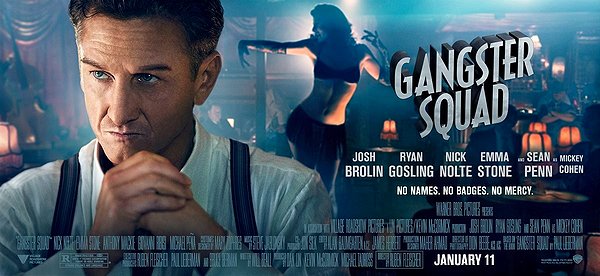
"Steeped in blood, gore, and violence, Gangster Squad delivers what fans of the gangster genre expect from a movie of this sort. It's chock-full of 'guilty pleasure' moments. Sean Penn, playing real-life mobster Mickey Cohen, hams it up expertly, channeling Al Pacino's Tony Montana without the accent. The good guys are stolid, sturdy men - paragons of virtue up against a feral villain who is so vile that even the notorious Chicago mob can't stand against him. Despite the talent of the cast, Gangster Squad isn't a 'prestige' motion picture and its release date shift from September 7 to January 11 didn't damage its nonexistent Oscar chances. It's an inferior Untouchables knock-off and proud of it."
Nick de Semlyen, EMPIRE
"Is The Untouchables untouchable? Gangster Squad director Ruben Fleischer has set out to prove not. His slick, all-star film takes the same dynamic as Brian De Palma’s Chicago classic — law-enforcers go off the books to battle a gangster on his own dirty terms — and transplants it to LA, aiming for something bigger, glitzier, nastier. But while it’s not lacking in visual razzle-dazzle or blood, story-wise it rarely manages to shock or excite.
"Where it does succeed, though, is with its villain. In The Untouchables, De Niro’s paunchy Al Capone put a baseball bat to foul use, but Sean Penn’s Mickey Cohen has even more lurid enthusiasms: dining on roast peacock, quoting Bela Lugosi’s Dracula, world-class swearing (he arrives at a raided brothel snarling, 'My whole crop of cunt is ruined.' Penn, wearing a prosthetic beak, has the time of his life. Behold as Cohen, in full view of the Hollywood sign, commands dogs to feast on a slain man’s innards. That’s the LA way...
"Gangster Squad is perfectly decent entertainment: it possesses a frequently witty script, a roster of likable, cool-looking stars, fizzy choreography and Sean Penn out-hamming Mr. Pricklepants. Yet there’s the lingering feeling that this is a safe studio film as opposed to a story that was burning to be told. Every beat is hit with mechanical efficiency, rather than taking risks and roaring with ambition. Not something you’d say about a Brian De Palma film."
Peter Debruge, Variety
"Opening with a scene in which Cohen chains a rival between two cars as a message to his Chicago bosses, this macho genre homage lands closer to The Untouchables than to L.A. Confidential as a self-aware gloss on old gangster pics...
"In the good guys' corner, there's Ryan Gosling, Anthony Mackie, Giovanni Ribisi, Robert Patrick and Michael Pena (a refreshingly mixed-race bunch, despite the period). Opposite, there's Penn's larger-than-life performance as Cohen, a feat of unbridled entitlement. He fumes and storms like some kind of Cro-Magnon monster who just stumbled from the cave to claim what is rightfully his, feral intensity amplified to a pitch not to be dwarfed by Al Pacino's Tony Montana, Robert De Niro's Al Capone or Harvey Keitel's own spin on Cohen in Bugsy."
Marshall Fine, Hollywood & Fine
"Calling it 'derivative' implies someone else having done this kind of thing before – and done it better. Well, gee, where to start? If you were to call this a West Coast version of The Untouchables, you wouldn’t be far off the mark, right down to a machine-gun fight on a large public staircase.
Oh wait, that’s right: Brian De Palma was quoting yet another film, Eisenstein’s Battleship Potemkin with his shoot-out in Chicago’s Union Station. I won’t accuse Fleischer of mimicking De Palma, because it seems obvious. Young filmmakers have been sampling Scarface on a regular basis for almost 30 years."
Siobhan Synnot, The Scotsman
"There are plenty of shootouts, slashings and the occasional bloody amputation, but little variety or thought to the script. Whenever a kingpin appears to shrug off some major cock-up in his empire, surely any self-respecting henchman realises this is his cue to flee, or at least pack a bulletproof vest? Not if you are a henchman in Gangster Squad. And while Penn attempts to bully his way through the film, his Cohen has none of internal subtleties of, say, Robert De Niro in The Untouchables."
Bill Goodykoontz, AZ Central
"The film is somewhat similar in structure and temperament to The Untouchables, Brian De Palma’s far superior 1987 film about Eliot Ness going after Al Capone. The head-on approach can only work for so long, so other methods must be found. As with De Palma’s film, despite being the good guys, O’Mara and his men must resort to unsavory, extra-legal means to level the playing field.
"There is a really good story in here somewhere. Cohen is a fascinating figure, operating in an interesting time. Here he’s a cardboard cutout, prone to hilarious bouts of rage (and bouts, period; he was a boxer). Think of any gangster cliché you’ve seen or heard, and Penn delivers. He is nothing if not thorough. Usually that’s a good thing. Here, not so much."
Chris Tilly, IGN
"Another film in whose shadow Gangster Squad will undoubtedly exist is The Untouchables, for while that film is set in a different city some 20 years earlier, their storylines are remarkably similar. Yet Brian De Palma’s Oscar-winner trumps Fleischer’s effort on pretty much every front, managing to entertain and excite while at the same time making the agents who eventually brought down Al Capone three-dimensional characters."
Nick Pinkerton, OC Weekly
"It's obvious, however, that [screenwriter Will] Beall is mostly drawing on his experience with other movies, particularly the previous generation of revisionist period crime dramas, such as Brian De Palma's 1987 The Untouchables, which Gangster Squad's plot hews close to, and Curtis Hanson's 1997 L.A. Confidential. Unlike Hanson's film, which had a shoe-leather realism, Gangster Squad looks as if all its details—each shiny Packard and bottle of Orange Nehi—have been scrupulously 'placed,' still warm from the art department, while panoramic shots recall no terrestrial city so much as the virtual environments of Rockstar Games' LA Noire."
Alonso Duraldi, The Wrap
"With its gleaming roadsters, sexy dames and swanky nightspots, Gangster Squad is clearly meant to summon fond memories of post-WWII-era noir films, not to mention more recent retro valentines like Chinatown and L.A. Confidential. But you’ll be forgiven for thinking that you’re watching The Untouchables II.
"Like David Mamet and Brian De Palma’s reboot of the classic crimebuster TV show, this new movie offers a stalwart cop with a devoted, red-headed wife, putting together a crew of renegade cops (including an old-timer and a bespectacled nerd) to take down a powerful and sadistic mobster played by a Method-fueled scenery chewer."
Dann Gire, Daily Herald
"I liked the Chicago version of Ruben Fleischer's Gangster Squad much better. It was titled The Untouchables.
"Will Bealls' screenplay to Gangster Squad, based on the book by Paul Lieberman, appears to have appropriated the American western conventions in Brian De Palma's 1987 Chicago-shot thriller, right down to the good guys' lovable, nerdy mascot purchasing the farm to cement our emotional opposition to the villains.
"It's all about a straight-shooting law man and dedicated family guy assembling a crack team of peace officers to wage a street war against a ruthlessly murderous, megalomaniac, big-city mob boss with most of the government in his back pocket.
"Gangster Squad throws in an extra romantic subplot and a climatic bare-knuckles boxing match, but nonetheless prompts comparisons to The Untouchables, right down to Sean Penn's recreation of mob boss Mickey Cohen as the raging Al Capone of L.A.
"Fleischer's Gangster Squad sidesteps the Chicago mythology of The Untouchables and the gritty realism of L.A. Confidential, preferring a sensationalistic, almost graphic novel approach, one exploding with flashy visuals peppered with blood-red lipstick, monochromatic nocturnal cityscapes, smartly tailored suits and blazing guns."
M. Faust, ArtVoice
"Not much beyond the title remains for this movie, which essentially reprises Brian De Palma’s The Untouchables for a Boardwalk Empire audience. Instead of Al Capone, the bad guy is Mickey Cohen, played ferociously by Sean Penn in a performance that you wish were in a better movie: The real Cohen was a lot more interesting than this one-note hoodlum. Josh Brolin has the Kevin Costner part (by way of Boardwalk’s Michael Shannon) of Sergeant John O’Mara, the straight arrow enlisted to assemble a band to work on the outer edges of the law.
"You can play this game all day if you want: Nerdly Charles Martin Smith is played by Giovanni Ribisi, ethnic outsider Andy Garcia by Michael Pena, etc. There’s even a moment of rage by Cohen, vowing vengeance on O’Mara, that is so similar to Capone’s rant in the De Palma movie ('I want him dead! I want his family dead!') that it has to be intentional.
"Gangster Squad gets high marks for its production design, recreating post-war LA as a riot of art deco glitz. It’s a great movie to look at, but blandly directed and photographed."
Cornish Guardian, This Is Cornwall
"Disappointingly, Fleischer's film lacks the finely detailed characters and dramatic tension of Brian De Palma's Prohibition-era drama."
Jeremy Kirk, First Showing
"The inevitable 'I want them all dead' tirade Penn's Cohen goes on is nothing as powerful or as memorable as Robert De Niro as Al Capone vowing vengeance against Kevin Costner's Elliott Ness, and the moments of violence against the Gangster Squad would be riveting if they weren't so familiar. By the time the film turns towards a shoot-out around an elaborate staircase and hotel lobby, you can't help but think it would be just as easy and a whole lot more fun to watch Brian De Palma's film and be done with it."
Mark Naglazas, The West Australian
"Gangster Squad was pulled after the cinema shooting in Aurora, Colorado, during a showing of The Dark Knight Rises and its climax, which originally took place in a movie theatre, reshot so that it now resembles the ending of Brian de Palma's Scarface."
There are plenty more reviews-- I'll post more links tomorrow.
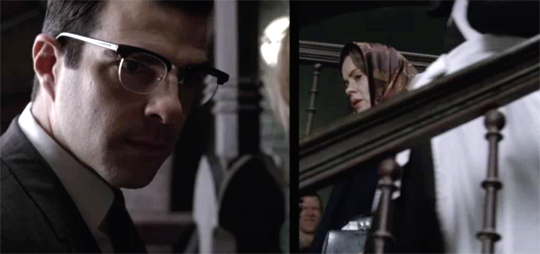
In any case, any time anyone these days does a split-screen sequence, Brian De Palma's name comes to mind, and this one is no different, with Entertainment Weekly's Jeff Jensen and Zap 2 it's Geoff Berkshire, among others, mentioning De Palma in their recaps of the episode. And of course, we know that Ryan Murphy has said that this season of AHS pays homage to De Palma, so it seems entirely likely that the split-screen was a nod to him.
The split screen happens on the stairs inside the asylum, and the technique allows Gomez-Rejon to create and milk a good amount of suspense between three characters as one tries to slip past another, and the third tries to distract.
In the first episode of this season, Pino Donaggio music from De Palma's Carrie was used in several scenes. This week's episode utilized music from Bernard Rose's Candyman, composed by Phillip Glass, during several sequences, including the split-screen sequence.
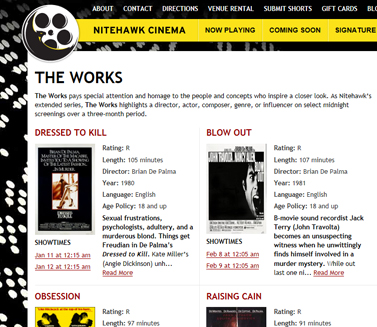 Nitehawk Cinema in Brooklyn, New York, begins a new midnight series this weekend called "The Works," which "pays special attention and homage to the people and concepts who inspire a closer look," according to the Nitehawk website. "As Nitehawk’s extended series, The Works highlights a director, actor, composer, genre, or influencer on select midnight screenings over a three-month period."
Nitehawk Cinema in Brooklyn, New York, begins a new midnight series this weekend called "The Works," which "pays special attention and homage to the people and concepts who inspire a closer look," according to the Nitehawk website. "As Nitehawk’s extended series, The Works highlights a director, actor, composer, genre, or influencer on select midnight screenings over a three-month period."Nitehawk is an 18-and-older cinema that serves food and beverages, including specialty dishes and drinks inspired by the films being featured. "The Cinema also presents thirty-minute 'Pre-shows' tailored to each movie that feature local filmmakers and clips curated by our cinema department," according to the Nitehawk website.